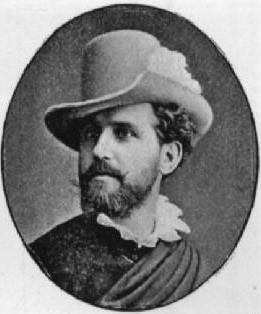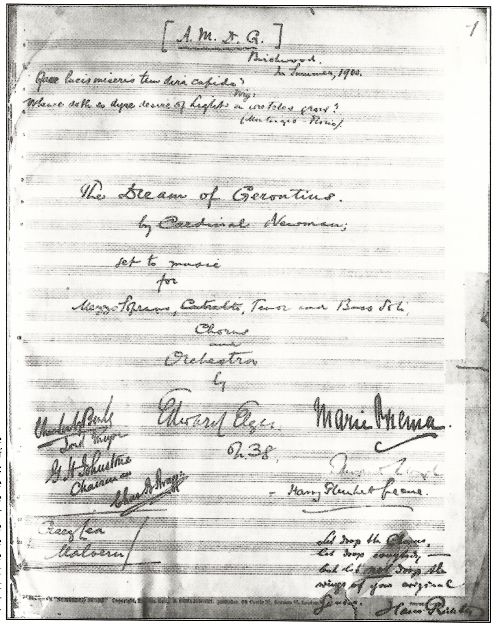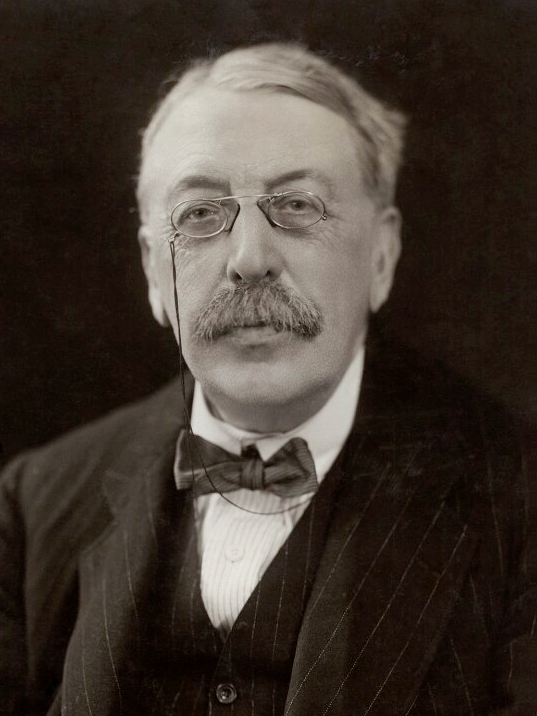|
Gervase Elwes
Gervase Henry Cary-Elwes, DL (15 November 1866 – 12 January 1921), better known as Gervase Elwes, was an English tenor of great distinction, who exercised a powerful influence over the development of English music from the early 1900s up until his death in 1921 due to a railroad accident in Boston at the height of his career. Background to his career Elwes was born in Billing Hall, Northampton, the son of Alice Geraldine (née Ward) and Valentine Dudley Henry Cary-Elwes, a descendant of John Elwes. Of the Northamptonshire and Lincolnshire landed gentry, he was educated at The Oratory School (a Roman Catholic school) and Woburn School, Weybridge, where he arrived in 1885, and finally at Christ Church, Oxford, where he was active as a cricketer and violinist. At the age of 22 he married Lady Winifride Mary Elizabeth Feilding, a daughter of Rudolph Feilding, 8th Earl of Denbigh. After Oxford he trained as a lawyer and diplomat, spending some years in Brussels, where he began h ... [...More Info...] [...Related Items...] OR: [Wikipedia] [Google] [Baidu] |
Gervase Elwes Signed
Gervase is a masculine given name which may refer to: Pre-modern era :''Ordered chronologically'' * Gervase of Besançon (died 685), saint and a bishop of Besançon * Gervase of Bazoches (died 1108), Prince of Galilee * Gervase of Blois (died c. 1157), Abbot of Westminster in England * Gervase of Canterbury (c. 1141–c. 1210), English chronicler * Gervase de Cornhill (c. 1110–c. 1183), Anglo-Norman royal official and sheriff * Gervase of Tilbury (c. 1150–c. 1228), English chronicler * Gervase of Ebstorf, author of the Ebstorf Map created c. 1234; possibly the same man as Gervase of Tilbury * Gervase Alard (1270–1340), Admiral of the Cinque Ports Fleet and Admiral of the Western Fleet of the English Navy Modern era :''Ordered alphabetically'' * Gervase Babington (1549/1550–1610), Bishop of Llandaff, Bishop of Exeter and Bishop of Worcester * Gervase Beckett (1866–1937), British banker and Member of Parliament * Gervase de Peyer (born 1926), English clarinettist and conduc ... [...More Info...] [...Related Items...] OR: [Wikipedia] [Google] [Baidu] |
Jacques Bouhy
Jacques-Joseph-André Bouhy (18 June 1848 – 29 January 1929) was a Belgian baritone, most famous for being the first to sing the "Toreador Song" in the role of Escamillo in the opera ''Carmen''. Bouhy was born in Pepinster. After studying at the Liège Conservatory of Music, he made his début at the Paris Opéra as Méphistophélès (''Faust'') in 1871. He performed at the Opéra-Comique as Figaro (''Le Nozze di Figaro''), Escamillo (''Carmen'') in 1875. At the Comique he also created the role of ''Don César de Bazan'' in 1872. In 1882 he appeared at Covent Garden singing in ''Faust'' and ''Carmen''. He spent time in the United States as the first director of the National Conservatory of Music of America in New York City before returning to Paris to sing the High Priest in ''Samson et Dalila'' (1890). He was extremely popular with audiences, and counted Massenet among his admirers. Singers taught by him or who received instruction from him include Gervase Elwes, Clara Butt, Lo ... [...More Info...] [...Related Items...] OR: [Wikipedia] [Google] [Baidu] |
Mark Raphael
Mark may refer to: Currency * Bosnia and Herzegovina convertible mark, the currency of Bosnia and Herzegovina * East German mark, the currency of the German Democratic Republic * Estonian mark, the currency of Estonia between 1918 and 1927 * Finnish markka ( sv, finsk mark, links=no), the currency of Finland from 1860 until 28 February 2002 * Mark (currency), a currency or unit of account in many nations * Polish mark ( pl, marka polska, links=no), the currency of the Kingdom of Poland and of the Republic of Poland between 1917 and 1924 German * Deutsche Mark, the official currency of West Germany from 1948 until 1990 and later the unified Germany from 1990 until 2002 * German gold mark, the currency used in the German Empire from 1873 to 1914 * German Papiermark, the German currency from 4 August 1914 * German rentenmark, a currency issued on 15 November 1923 to stop the hyperinflation of 1922 and 1923 in Weimar Germany * Lodz Ghetto mark, a special currency for Lodz Ghetto. ... [...More Info...] [...Related Items...] OR: [Wikipedia] [Google] [Baidu] |
Gerald Moore
Gerald Moore Order of the British Empire, CBE (30 July 1899 – 13 March 1987) was an England, English classical music, classical pianist best known for his career as a Collaborative piano, collaborative pianist for many distinguished musicians. Among those with whom he was closely associated were Dietrich Fischer-Dieskau, Elisabeth Schumann, Hans Hotter, Elisabeth Schwarzkopf, Victoria de los Ángeles and Pablo Casals. Moore gave lectures on stage, radio and television about musical topics. He also wrote about music, publishing volumes of memoirs and practical guides to interpretation of lieder. Life and career Early years Moore was born in Watford, Hertfordshire, the eldest of four children of David Frank Moore, owner of a men's outfitting company, and his wife Chestina, ''née'' Jones.Joseph Cooper (broadcaster), Cooper, Joseph"Moore, Gerald Frederick (1899–1987)" Oxford Dictionary of National Biography, Oxford University Press, 23 September 2004. Retrieved 17 June 2021 H ... [...More Info...] [...Related Items...] OR: [Wikipedia] [Google] [Baidu] |
Coenraad V
Coenraad is a Dutch given name. Notable persons with that name include: *Coenraad van Beuningen (1622–1693), diplomat for Dutch Republic *Coenraad Beyers (1893–1975), South African historian, archivist, and herald *Coenraad Bloemendal (born 1946), Canadian cellist *Coenraad Bron (1937–2006), Dutch computer scientist who worked with Edsger W. Dijkstra on Algol-68 *Coenraad de Buys (1761–1821), Cape Colony cattle raider * Hasselt (1797–1823), Dutch physician, zoologist, botanist and mycologist *Coenraad Hiebendaal (1879–1921), Dutch rower who competed in the 1900 Summer Olympics *Coenraad Johannes van Houten (1801–1887), Dutch chemist and chocolate maker * Barend Coenraad Petrus Jansen (1884–1962), Dutch chemist and biochemist who isolated vitamin B1 * Coenraad Jacob Temminck (1778–1858), Dutch aristocrat and zoologist See also * Coen (other) * Koenraad * Conrad (name) Conrad is a Germanic masculine given name and a surname. Origin and meaning It is ... [...More Info...] [...Related Items...] OR: [Wikipedia] [Google] [Baidu] |
Raimund Von Zur-Mühlen
Baron Raimund von zur-Mühlen (sometimes "Raymond", "Raimund von Zur Mühlen") (10 November 1854 in Uusna Manor (''Neu-Tennasilm''), Viljandi Parish (now in Viiratsi Parish), Viljandi County, Governorate of Livonia – 11 December 1931 in Wiston, near Steyning, England) was a celebrated tenor Lieder singer who also became a famous teacher of singing, instructing many famous artists. His Lieder-interpretations are legendary. Life and carrier He was a student of Auguste Hohenschildt, Felix Schmidt, Adolf Schulze, Julius Stockhausen and Clara Schumann. He made his debut in 1878, together with Hans Schmidt, in Riga. After this he continued working on his capabilities as a singer, above all with Manuel Garcia, Beniamino Carelli and Pauline Viardot.This paragraph derived from German wikipedia. He is recognised as a founder of the Lieder-abend or evening recital of the German concert Lieder as a distinct performance entity. His interpretation of Lieder and his specialist stud ... [...More Info...] [...Related Items...] OR: [Wikipedia] [Google] [Baidu] |
Harry Plunket Greene
Harry Plunket Greene (24 June 1865 – 19 August 1936) was an Irish baritone who was most famous in the formal concert and oratorio repertoire. He wrote and lectured on his art, and was active in the field of musical competitions and examinations. He also wrote ''Where the Bright Waters Meet'' (1924) a book about fly fishing. Training Plunket Greene was born in Dublin, the son of Richard Jonas Greene, a barrister, and Louisa Lilias Plunket, a children's writer, granddaughter of William Conyngham Plunket, Lord Chancellor of Ireland. He was educated at Clifton College and initially expected to follow Law at Oxford. However, after he was 'smashed up' in a football accident he had a year's convalescence. Discovering his musical calling he studied under Arthur Barraclough in Dublin before attending the Stuttgart Conservatory for two years under Hromada in the early 1880s. He also studied in Florence with Luigi Vannuccini (a pupil of Francesco Lamperti), and in London with J. B. W ... [...More Info...] [...Related Items...] OR: [Wikipedia] [Google] [Baidu] |
The Dream Of Gerontius
''The Dream of Gerontius'', Op. 38, is a work for voices and orchestra in two parts composed by Edward Elgar in 1900, to text from the poem by John Henry Newman. It relates the journey of a pious man's soul from his deathbed to his judgment before God and settling into Purgatory. Elgar disapproved of the use of the term "oratorio" for the work (and the term occurs nowhere in the score), though his wishes are not always followed. The piece is widely regarded as Elgar's finest choral work, and some consider it his masterpiece. The work was composed for the Birmingham Music Festival of 1900; the first performance took place on 3 October 1900, in Birmingham Town Hall. It was badly performed at the premiere, but later performances in Germany revealed its stature. In the first decade after its premiere, the Roman Catholic theology in Newman's poem caused difficulties in getting the work performed in Anglican cathedrals, and a revised text was used for performances at the Three Choir ... [...More Info...] [...Related Items...] OR: [Wikipedia] [Google] [Baidu] |
Edward Elgar
Sir Edward William Elgar, 1st Baronet, (; 2 June 1857 – 23 February 1934) was an English composer, many of whose works have entered the British and international classical concert repertoire. Among his best-known compositions are orchestral works including the ''Enigma Variations'', the ''Pomp and Circumstance Marches'', concertos for Violin Concerto (Elgar), violin and Cello Concerto (Elgar), cello, and two symphony, symphonies. He also composed choral works, including ''The Dream of Gerontius'', chamber music and songs. He was appointed Master of the King's Musick in 1924. Although Elgar is often regarded as a typically English composer, most of his musical influences were not from England but from continental Europe. He felt himself to be an outsider, not only musically, but socially. In musical circles dominated by academics, he was a self-taught composer; in Protestant Britain, his Roman Catholicism was regarded with suspicion in some quarters; and in the class-consci ... [...More Info...] [...Related Items...] OR: [Wikipedia] [Google] [Baidu] |
Hubert Parry
Sir Charles Hubert Hastings Parry, 1st Baronet (27 February 18487 October 1918) was an English composer, teacher and historian of music. Born in Richmond Hill in Bournemouth, Parry's first major works appeared in 1880. As a composer he is best known for the choral song "Jerusalem", his 1902 setting for the coronation anthem "I was glad", the choral and orchestral ode '' Blest Pair of Sirens'', and the hymn tune "Repton", which sets the words "Dear Lord and Father of Mankind". His orchestral works include five symphonies and a set of Symphonic Variations. He also composed the music for ''Ode to Newfoundland'', the Newfoundland and Labrador provincial anthem (and former national anthem). After early attempts to work in insurance at his father's behest, Parry was taken up by George Grove, first as a contributor to Grove's massive '' Dictionary of Music and Musicians'' in the 1870s and '80s, and then in 1883 as professor of composition and musical history at the Royal College of ... [...More Info...] [...Related Items...] OR: [Wikipedia] [Google] [Baidu] |
Charles Villiers Stanford
Sir Charles Villiers Stanford (30 September 1852 – 29 March 1924) was an Anglo-Irish composer, music teacher, and conductor of the late Romantic music, Romantic era. Born to a well-off and highly musical family in Dublin, Stanford was educated at the University of Cambridge before studying music in University of Music and Theatre Leipzig, Leipzig and Berlin. He was instrumental in raising the status of the Cambridge University Musical Society, attracting international stars to perform with it. While still an undergraduate, Stanford was appointed organist of Trinity College, Cambridge. In 1882, aged 29, he was one of the founding professors of the Royal College of Music, where he taught composition for the rest of his life. From 1887 he was also Professor of Music (Cambridge), Professor of Music at Cambridge. As a teacher, Stanford was sceptical about modernism, and based his instruction chiefly on classical principles as exemplified in the music of Johannes Brahms, Brahms ... [...More Info...] [...Related Items...] OR: [Wikipedia] [Google] [Baidu] |
Royal College Of Music
The Royal College of Music is a music school, conservatoire established by royal charter in 1882, located in South Kensington, London, UK. It offers training from the Undergraduate education, undergraduate to the Doctorate, doctoral level in all aspects of Western Music including performance, composition, conducting, music theory and history. The RCM also undertakes research, with particular strengths in performance practice and performance science. The college is one of the four conservatories of the ABRSM, Associated Board of the Royal Schools of Music and a member of Conservatoires UK. Its buildings are directly opposite the Royal Albert Hall on Prince Consort Road, next to Imperial College and among the museums and cultural centres of Albertopolis. History Background The college was founded in 1883 to replace the short-lived and unsuccessful National Training School for Music (NTSM). The school was the result of an earlier proposal by the Albert, Prince Consort, Prince Con ... [...More Info...] [...Related Items...] OR: [Wikipedia] [Google] [Baidu] |







